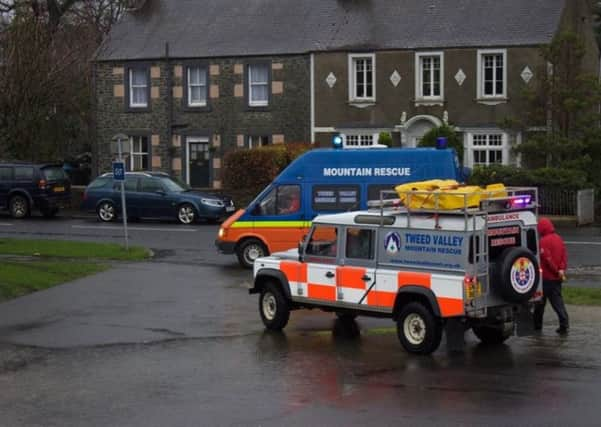Facing Storm Frank with Mountain Rescue


The team took to Facebook to describe their role in helping people in the wake of Storm Frank:
Two Days before Storm Frank - Monday December 28
In light of the Met Office Amber warning impacting a large area of Southern Scotland, a decision was made by Galloway, Moffat, Tweed Valley, Borders Search and Rescue and Ochils Teams to open up a joint incident log on their incident logging system called SARCALL – this log would be known as the ‘Silver’ log and would show, at a reasonably high level, what each teams availability was at any point in time as well as a summary of any ongoing incidents over the next few days.
Advertisement
Hide AdAdvertisement
Hide AdAt this stage, Team Leaders requested availability from their Team Members for the next 48hours
Having a joint Silver log allowed teams to see where support could be offered or requested from if a particular situation became too great for one MRT to handle on its own.
The Day before Storm Frank – Tuesday December 29
Tweed Valley MRT were placed on Formal Standby by Police Scotland around 11am regarding Storm Frank.
Team specific ‘Bronze’ Logs were opened up in the SARCALL system to track taskings at a more granular level than the overall ‘Silver’ log
Advertisement
Hide AdAdvertisement
Hide AdAt 8pm Scottish Borders Council opened their Resilience Room where representatives of the agencies involved in the response to Storm Frank could work together to ensure a joined up approach was taken when dealing with any incidents.
Storm Frank – Wednesday December 30
5.25am - Tweed Valley MRT were requested to assist in the evacuation of homes in the Hawick area. This involved team members knocking on doors in areas at risk of flooding and requesting residents move to a designated reception centre.
7
.30am - Meetings in the SBC Resilience Room with input from SEPA and the Met Office flagged the situation in Hawick as stable and Peebles as a very high risk area with data models showing the river would break peak levels since SEPA records began. Tweed Valley MRT were stood down from Hawick and asked to move to Peebles.
11am - Team Members were deployed to areas of Peebles to work door to door, asking residents to evacuate to reception centers. Assistance was given to a number of residents who did not have their own transport or had mobility issues. During this task notes were taken of any residents who opted not to evacuate – this data was then passed back to control and would be used later on for welfare checks. MRT Members can only recommend that residents evacuate; those who choose to stay do so at their own risk but wherever possible MRT still try to check up on people even if that is a wave through a window with a thumbs up or down from a distance.
Advertisement
Hide AdAdvertisement
Hide Ad1.25pm – Fire and Ambulance Services attending a car stuck in water at Stobo requested MRT assistance to get close to the stranded vehicle. The driver was trapped inside with water to her waist and a bystander who had tried to assist became stranded and was sitting on top of the car. A Royal Navy Seaking Rescue 177 was on the scene and was re-deployed very shortly after arriving to a bus trapped in water in the Ayrshire.
Until 10.30pm welfare checks on houses in flooded areas and high visibility patrols were carried out by MRT members when TVMRT were fully stood down.
The Day After Storm Frank – Thursday December 31
Once the team stood down, members needed to get themselves and their kit dried and repacked, team vehicles needed refuelled and washed.